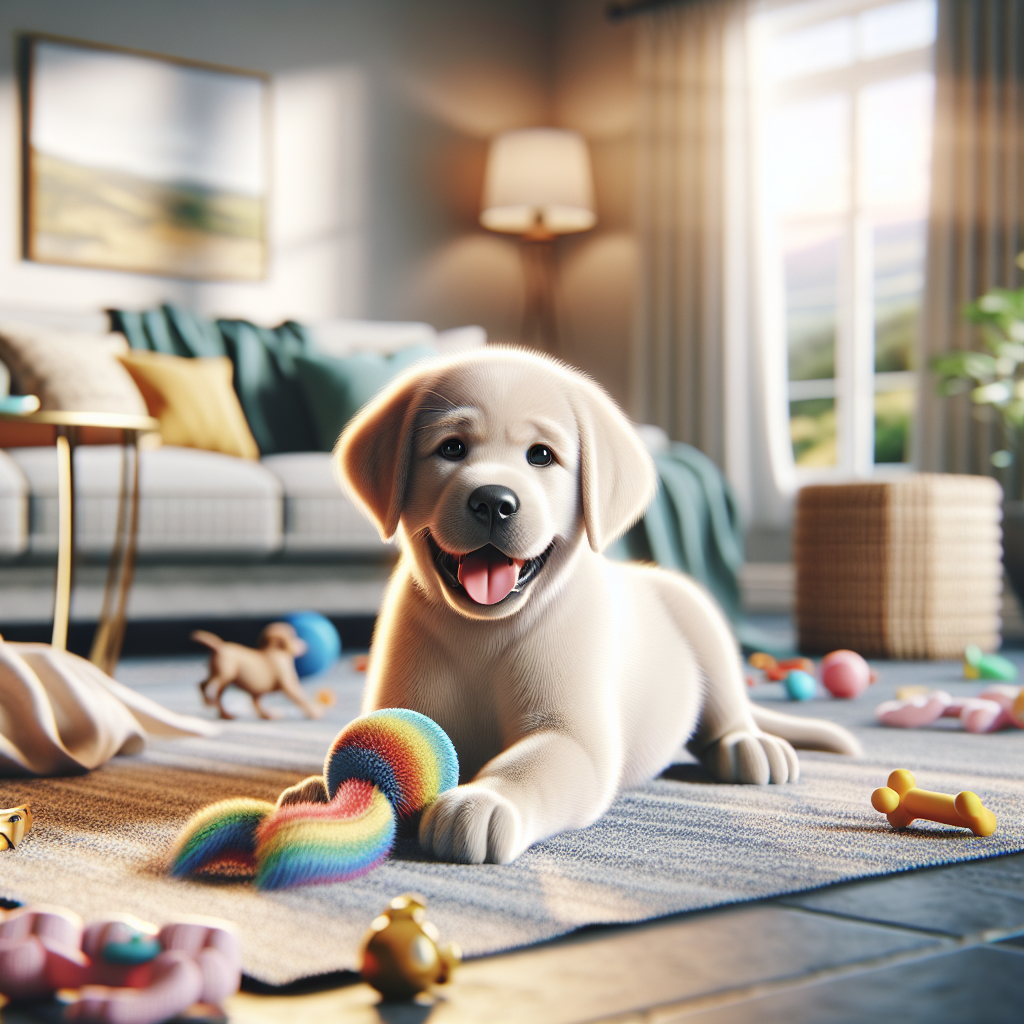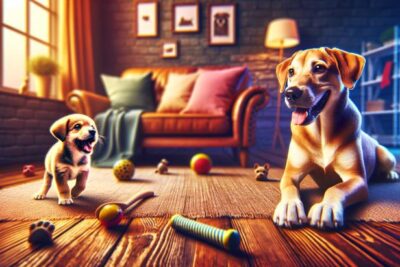
Recomendaciones para criar un cachorro juguetón

Welcoming a playful puppy into your home can be an incredibly rewarding experience, filled with joy and companionship. However, raising a spirited little friend can also present unique challenges. To ensure that your playful pup grows into a well-behaved and socially balanced dog, it's essential to implement effective strategies right from the start. This article will explore valuable recommendations that will help you nurture your lively companion while fostering a loving and structured environment.
From establishing a consistent routine to encouraging positive behaviors, the foundation you lay during your puppy’s formative months is crucial. Engaging in playtime is not only vital for their physical development but also for their mental stimulation, aiding in the prevention of undesired behaviors. By following these guidelines, you can create a harmonious relationship with your energetic puppy, ensuring they thrive in their new home.
Tips for Raising a Playful Puppy
Raising a playful puppy can be a rewarding experience, filled with joy and laughter. To ensure your puppy develops into a well-behaved and happy adult dog, it's important to establish a routine that incorporates both playtime and training. Regular play sessions not only strengthen your bond but also help to expend your puppy's energy, which is crucial for their overall well-being.
One of the best ways to stimulate your puppy is through interactive toys and games. These can include puzzle toys that challenge their mind, as well as fetch and tug-of-war games that engage their physical energy. Here are some tips to keep in mind:
- Rotate toys regularly to keep their interest piqued.
- Introduce new games to challenge their cognitive skills.
- Schedule playdates with other puppies to socialize them.
Training should be an integral part of your puppy's play routine. Incorporating positive reinforcement techniques during play can help them learn commands while having fun. For example, you can use treats to reward your puppy for responding to commands during fetch or while playing tug-of-war. This not only enhances their training but also makes the learning process enjoyable.
Finally, remember that patience is key when raising a playful puppy. Each puppy is unique, and understanding their individual personality will help you tailor your activities accordingly. Always ensure that the playtime is safe and appropriate for their age. By following these tips, you can nurture a well-adjusted and playful companion for years to come.
Essential Supplies for Your Playful Puppy
When bringing a playful puppy into your home, having the right supplies is crucial for their development and happiness. Basic essentials include quality food, a comfortable bed, and appropriate toys that encourage interactive play. These items not only meet their basic needs but also aid in their socialization and training process. Ensuring you have a variety of toys will keep your pup engaged and stimulate their growing mind.
Another important category of supplies includes grooming tools. Regular grooming not only keeps your puppy looking their best but also promotes a healthy coat and skin. Essential grooming supplies may include:
- Dog brush
- Shampoo suitable for puppies
- Nail clippers
These tools help you bond with your puppy while teaching them to enjoy being handled and groomed.
Don't forget about safety supplies that can protect your lively pup from potential hazards. A well-fitted collar and leash are essential for walks and outings. Additionally, consider investing in a puppy-proof crate to provide a safe space for your puppy when you're unable to supervise them. This can prevent destructive behavior and keep your home intact while your puppy learns the ropes.
Finally, consider investing in training aids to help guide your puppy's behavior. Treats, clickers, and training pads can be incredibly valuable for establishing good habits from an early age. Having the right supplies not only makes raising a playful puppy easier but also enhances the overall bonding experience between you and your furry friend.
Socializing your playful puppy is a crucial step in their development, helping them become well-adjusted adults. Start by introducing your puppy to a variety of environments, people, and other animals. This exposure should be positive, so ensure that each experience is enjoyable. Gradually exposing them to different situations can significantly enhance their confidence and social skills.
One effective method to socialize your playful puppy is to organize regular playdates with other dogs. This allows them to engage in natural behaviors and learn important social cues. Here are some tips for successful playdates:
- Choose the right dogs: Ensure the dogs are friendly and have similar energy levels.
- Supervise interactions: Always monitor the play to prevent any negative experiences.
- Keep it short: Limit playtime to prevent overstimulation, gradually increasing the duration as your puppy becomes more comfortable.
Additionally, enrolling your puppy in a training class can provide structured socialization opportunities. These classes not only teach obedience but also allow puppies to interact with both humans and other dogs. Look for classes that focus on positive reinforcement techniques to ensure a fun learning environment.
Finally, it's essential to expose your puppy to various sounds, sights, and experiences. Take them on car rides, visit pet-friendly stores, or introduce them to different surfaces like grass, gravel, and sand. Remember, the key to effective socialization is to make each experience positive, as this will help your puppy grow into a confident and well-behaved adult dog.
Training Techniques for Energetic Puppies
Training energetic puppies requires a blend of patience, consistency, and engaging techniques that cater to their playful nature. It's essential to establish a strong foundation through basic obedience commands, such as "sit," "stay," and "come." These commands not only enhance communication but also provide mental stimulation for your puppy. Using positive reinforcement techniques, such as treats and praise, can significantly improve their learning experience.
Incorporating play into training sessions can make the process more enjoyable for both you and your puppy. Short and fun training bursts are often more effective than lengthy sessions. Consider using the following techniques to keep your energetic puppy engaged:
- Clicker training: Use a clicker to mark desired behaviors, followed by a reward.
- Interactive toys: Utilize puzzle toys that challenge your puppy's problem-solving skills.
- Obstacle courses: Set up simple courses in your backyard for physical and mental exercise.
Socialization is another critical aspect of training energetic puppies. Exposing them to different environments, people, and other animals helps them develop confidence and reduces anxiety. Regularly taking your puppy to parks or puppy classes allows them to learn manners and engage in positive interactions. Always supervise their interactions to ensure that they are safe and constructive.
Lastly, remember that consistency is key. Establish a routine for feeding, playtime, and training to help your puppy understand what to expect. Be patient, as energetic puppies may take time to grasp new concepts. With love, attention, and the right training techniques, you can successfully channel their energy into positive behaviors.
Understanding Your Playful Puppy’s Behavior
Understanding your playful puppy’s behavior is essential for fostering a healthy relationship and ensuring their development. Puppies are naturally curious and energetic, and their playful antics are a way for them to explore their environment and learn about social interactions. Recognizing the different types of play can help you understand their needs and respond appropriately. Play can be categorized into several types, including:
- Social Play: Interactions with people or other animals.
- Object Play: Engaging with toys or household items.
- Exploratory Play: Investigating their surroundings.
When observing your puppy, it's crucial to note their body language and vocalizations. A relaxed posture, wagging tails, and playful barks indicate a happy and engaged puppy. Conversely, if your puppy exhibits signs of stress, such as tucked tails or growling, it may be time to intervene. Observing and understanding these cues will allow you to enhance their playtime experience and create a safe environment for exploration.
Additionally, providing appropriate outlets for your puppy's energy is vital. Regular exercise and interactive toys can help manage their playful behavior while strengthening your bond. Engaging in activities such as:
- Fetch: A great way to exercise and teach retrieval.
- Agility training: Stimulates both mind and body.
- Hide and seek: Encourages mental stimulation and fun.
In conclusion, understanding your playful puppy's behavior involves recognizing their play styles, observing their body language, and providing suitable activities that cater to their energetic nature. By fostering an environment where your puppy can safely play and explore, you will not only support their development but also cultivate a joyful companionship that lasts a lifetime.
Creating a Safe Environment for Your Playful Puppy
Creating a safe environment for your playful puppy is essential for their health and well-being. Puppies are naturally curious and energetic, often exploring their surroundings with enthusiasm. To ensure that your home is a safe haven for your furry friend, consider implementing the following measures:
- Remove any hazardous items, such as small objects that could be swallowed or sharp tools.
- Secure electrical cords and outlets to prevent accidental shocks.
- Store household cleaners and chemicals out of reach or in locked cabinets.
Designating a specific area for your puppy to play can also be beneficial. This space should be free of distractions and dangers, allowing your puppy to engage in safe play. Consider using a puppy pen or a gated area to create a cozy zone where they can enjoy their toys and interact with you without the risk of injury.
Finally, it’s important to regularly monitor your puppy's environment for any changes. As your puppy grows and learns, they may find new ways to get into trouble. Routinely check for any potential hazards and adjust your safety measures accordingly. By proactively managing your puppy's environment, you can ensure they have the freedom to play while staying safe.
Si quieres conocer otros artículos parecidos a Recomendaciones para criar un cachorro juguetón puedes visitar la categoría Pruebas.
Deja un comentario





Relacionadas